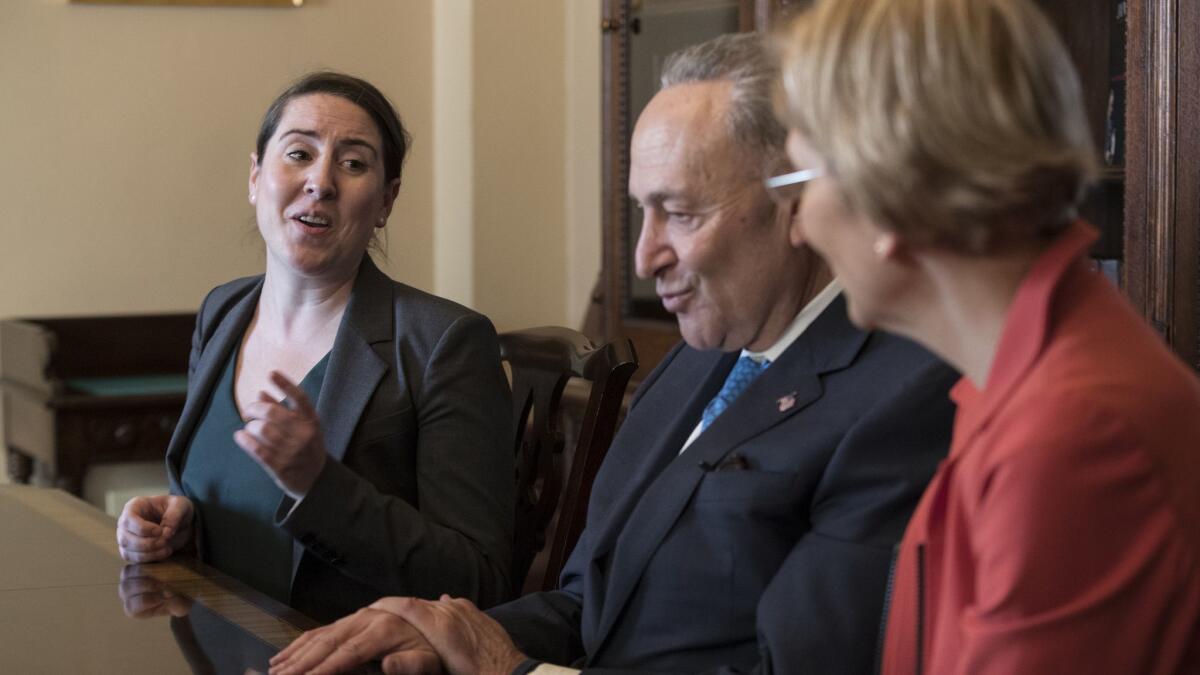Leandra English resigns from CFPB and drops her legal fight to be its acting director

Reporting from Washington — Leandra English is dropping her legal fight to temporarily lead the Consumer Financial Protection Bureau and will step down as the agency’s deputy director, she and her attorney announced Friday.
English said in a statement that she made the decision in light of President Trump’s nomination last month of Kathy Kraninger to be the CFPB’s permanent director. English said she will leave the bureau next week and told her bureau colleagues, “It has been an honor to work alongside you.”
English went to court last year after Trump appointed Mick Mulvaney as acting director, arguing that the Dodd-Frank law mandated that as deputy director, she — not a new appointee — should take over as interim chief.
After losing her attempts to get a federal judge to issue a temporary restraining order, then a preliminary injunction removing Mulvaney, English appealed. A three-judge panel of the U.S. Court of Appeals for the D.C. Circuit heard the appeal in April but has yet to rule.
English’s attorney, Deepak Gupta, said Friday they would drop the appeal.
“Now that President Trump has decided to seek Senate confirmation of a new Director for the independent Consumer Financial Protection Bureau, Ms. English is stepping down and we intend to file court papers on Monday to bring the litigation to a close,” Gupta said in a statement.
Congressional Democrats and consumer advocates had backed English in her fight against Mulvaney, who was an outspoken critic of the bureau and has moved to scale back its aggressive enforcement since taking the temporary reins in November.
“From the earliest days of the CFPB, Leandra has directed her passion and formidable skills to building a strong, professional agency that stands up for consumers,” said Sen. Elizabeth Warren (D-Mass.), who originally conceived of the agency as a law professor and helped launch it as an aide to President Obama. “I’m grateful for her service and wish her the best in her future endeavors.”
Christopher Peterson, the director of financial services at the Consumer Federation of America, said it was understandable English would “move on” after Trump’s nomination of Kraninger.
“After months of delay, the country still does not have a confirmed director to lead this critical consumer protection agency,” Peterson said. “The Trump administration needs to put its chaotic transition period behind and focus on ensuring our country’s financial services are safe, fair and transparent.”
The dispute over acting leadership of the agency began Nov. 24 when the bureau’s first director, Richard Cordray, a Democrat appointed by Obama, stepped down early from his five-year term to run for governor of Ohio.
On the same day, Cordray promoted English, his chief of staff, to deputy director and said she would be the acting director under a provision of the 2010 Dodd-Frank Wall Street Reform and Consumer Protection Act that created the bureau.
Within hours of Cordray’s resignation announcement, Trump appointed Mulvaney, the director of the White House Office of Management and Budget, to fill the consumer post temporarily under the Federal Vacancies Act of 1998. The administration said that law allowed Trump to appoint an official who already had been confirmed by the Senate in another capacity to also serve as the bureau’s acting director.
Mulvaney and English showed up at CFPB’s Washington headquarters on Nov. 27, the first workday after the dueling appointments, and each claimed to be the rightful acting director. Mulvaney took over the director’s office, and English went to court.
Mulvaney did not fire her as the case worked its way through the legal system. She apparently continued to report for work, although Mulvaney testified at a Senate hearing in April that he had never met her. Gupta and a spokesman for Mulvaney did not immediately respond to a request for comment Friday.
Under the vacancies law, Mulvaney could serve as acting director only for 210 days unless Trump nominated a permanent director. With that deadline looming last month, Trump tapped Kraninger, a little-known White House aide who worked for Mulvaney at the Office of Management and Budget. He can continue in the job while the Senate considers her nomination.
Critics have said Kraninger is not qualified for the job because she has no apparent relevant experience in finance, banking regulation or consumer protection.
Twitter: @JimPuzzanghera
UPDATES:
2:40 p.m.: This article was updated with comments from Sen. Elizabeth Warren, Christopher Peterson of the Consumer Federation of America and additional background.
This article originally was published at 9:45 a.m.
More to Read
Inside the business of entertainment
The Wide Shot brings you news, analysis and insights on everything from streaming wars to production — and what it all means for the future.
You may occasionally receive promotional content from the Los Angeles Times.










